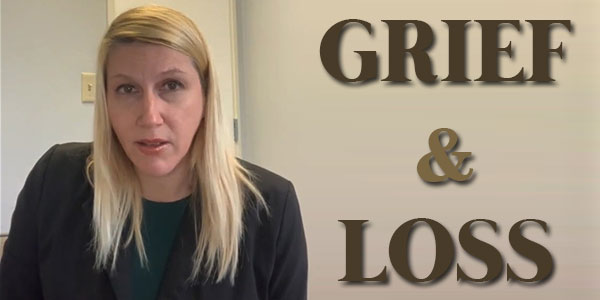
When we lose a loved one, it can take lots of time to heal and learn to live life without that person. Grief is a natural response to loss but if the grief is overwhelming or the duration is abnormally long, it can put your physical and mental health at risk. And so, the awareness is important because with a proper guidance you can find a way to pick up the pieces and learn to move on in your life.
Check out the Video Transcript
Hi my name is Ailsa Long and I’m a therapist here at Savant care I’m here today to talk to you all about grief and loss to talk about the different stages that we all go through when we’re grieving a loved one as well as go over some coping skills that can be helpful and get helping us get through a major loss in our life.
So if you haven’t heard about the stages before of grief then I hope that this video is informative and I hope that you learn something so when we lose a loved one in our life especially somebody that we have known for a long time a friend, a family member, or a loved one we go through a whole bunch of different emotions that are very difficult to understand.
The first stage that we go through is a stage called denial when we are going through denial we basically are feeling a variety of emotions because we’ve lost a loved one.
We are denying that the loss has occurred, we are denying that they’re really gone, we’re thinking that it’s probably just a dream, we’re hoping it’s not reality, we’re hoping that the news we got isn’t true, so we’re in denial that then that has occurred and denial is a way that we something that we use to cope with the devastation that we’ve just learned about losing a loved one.
So, if you’ve ever gone through the stage of denial just know that it’s a very normal stage, it’s very natural emotions that you go through when you’re grieving a loved one, the next stage that we go through when we’re grieving is a stage called bargaining.
I don’t know if you’ve heard of the stage bargaining, but basically, bargaining means that we are thinking about the person a lot, we’re bargaining with ourselves, we’re bargaining with God, we’re bargaining with the doctors, hoping that the person hasn’t actually left us, hoping that this is all a dream, hoping that the prison’s still okay, that it’s not a reality, that we’ve lost somebody bargaining can be a very intense emotion, that you feel when you’re grieving because it’s almost a state of feeling like the loss, that you’ve endured is unreal, and you would do anything to get the person back, and we all go through it.
When we’re grieving the next stage that we go through when we’re grieving a loved one is the stage called anger.
When we’ve lost somebody we feel very angry, we feel no one understands, no one’s gonna be able to be there to support me.
You feel angry at the world you feel angry at your friends, and family you’ve got angry at the doctor’s, that try to help the person that you lost you feel angry in general, and that can manifest in a lot of ways it can manifest in isolating yourself.
It can manifest, and you know having more you know verbal fights with your family because you’re just in a bad state you’re feeling angry at everyone you’re feeling like it was unfair you’re feeling like you can’t believe it just happened, and you just feel angry, and so I want you to know if you’re in the stage of grief anger it’s a very normal stage to go through, it’s very normal the only time that it would not be normal is.
If you’re having you know self-destructive thoughts, or you’re thinking about hurting yourself, those are things that are a little bit more extreme, that would be not a normal feeling of grief.
It would be more in-depth that you would need to get some help for so just pay attention to your feelings when you’re feeling angry because that is definitely a feeling that we go through when we’ve lost somebody.
Because we feel cheated, we feel like what’s happened to us, is very unfair, and we don’t want to believe it. So we try to blame whoever we can blame, about the loss to feel better the next things, that we go through when we’re grieving somebody is depression.
Depression that we feel, when we’re grieving, is very different from depression, that we feel you know in other ways like major depression or clinical depression.
You can feel depressed when you’re grieving because we’re finally getting to this place, that you feel extreme loss, and pain and you feel very sad, that you have lost the person, that you care about, and you’ve realized that they’re not coming back, in the physical world.
So we feel a sense of loss, we feel a sense of sadness, and hurt, and depression and this is a stage where you may cry a lot, you may be driving to work, and you hear a certain song that reminds you of the person that you lost and you feel bad, you feel sad, you feel like you want to cry, you can go into panic mode, and you know hyperventilate, you can there’s a lot of feelings that come up when we’re in the depression stage of grief, and those are all normal.
And yet again, as I said earlier, unless it’s something more extreme, like feeling self-destructive, or wanting to hurt yourself, and that’s a little bit more extreme than the natural feelings that we go through. When we’re grieving and you would need to get the help you know right away from a professional.
So the last stage, that I’m going to talk about, that has to do with grief is the final stage of acceptance now that we’ve gone through all the stages of grieving a loss one.
We finally get to the place where we can accept that the person that we have loved, and lost is gone we’ve accepted, that they are not here with us anymore, but we still have their memories around, and we can still look at their memories, we can still think about them.
We may then you know have pictures of them around the house that we can look at without crying like we used to and this is a stage that you know is the final stage of grieving, which is called acceptance.
We’re finally realizing that we can accept that the loss has happened. We may not ever forget this person. that we’ve lost. But we accept that it’s happened. and we’re now starting to feel a bit more hopeful.
We’re starting to feel like we can go forward in our life, we can get back into what we used to enjoy, we can get back into our normal routine, without crying, without feeling down, without feeling lost, without feeling sad, we just go on with their life, and we think about the person, and the memories, but we feel a bit more hopeful in this last stage of acceptance.
We feel very hopeful, that we can go on, and just have the memories to keep us going, and just remember, if you’re going through grief, it’s not like you go through one stage, at a time necessarily, you could go through all the stages, you could go up, and down in the stages grief is like a roller coaster, you could feel a lot of the different emotions, at one time.
You could be stuck in one stage for a long time, and not the others it could take you years to get to the final stage. It’s such an individual experience for each person. So I just want to remind everyone that, if you have lost somebody in your grieving.
Please make sure to look for help, and to ask for support from your friends, and family please go out, and seek a professional to talk to like a therapist, or psychiatrist, and also there are great support groups out there that you can go to to talk to people that are going through the same thing as you are for support, and those are very important things to remember.
When you’re grieving a loved one. and just remember that the person is everything be far from your mind, you’re always gonna miss them, but there are ways to get support, and to feel better and took the hopeful again and be happy in your life.
I hope that this video was helpful I hope you learned something about grief and loss and have a great day thank you!!
 Written by Ailsa Long, LMFT, On Jan 8, 2020
Written by Ailsa Long, LMFT, On Jan 8, 2020
Ailsa Long, a licensed marriage and family therapist with a Master’s degree in Clinical Psychology. My expertise includes depression, PTSD, relationship problems, stress, behavioral issues, and trauma…
